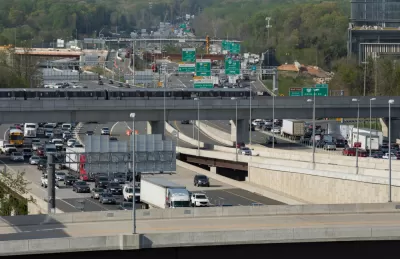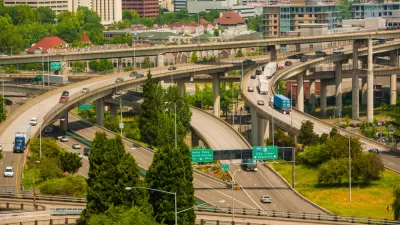Transportation is the largest source of greenhouse gas emissions in the D.C. region—and the rest of the country. The D.C. region is committing to drastic actions to change their ways, however.

“Leaders from around the D.C. area voted Wednesday to adopt aggressive greenhouse gas reduction goals for the transportation sector, pledging to cut carbon emissions by 50% by 2030,” reports Jacob Fenston for DCist.
The vote by the National Capital Region Transportation Planning Board (TPB), part of the Metropolitan Washington Council of Governments, came as somewhat of a surprise, according to Fenston. “The board was set to vote on a much more modest proposal to cut emissions by 32%, which planners said was realistic yet still ambitious. That goal was upped to 50% through an amendment put forward by Montgomery County.”
According to the article, TPB's ambitious targets will be aided by several initiatives ready to contribute to the cause:
- “making half of new cars electric or fueled by other carbon-free sources by 2030;
- “building an electric vehicle charging network;
- “completing a regional trail network to boost biking and walking;
- “building 77,000 new homes around transit hubs; and cutting travel times on bus and rail.”
This editor should note, however, the evidence that electric cars aren’t the emissions panacea some hope.
“Other strategies to be further explored include changes that could be more expensive or politically unpalatable, such as a tax on vehicle miles traveled, making all public transit free, and charging a fee to drive in downtown D.C. and other activity centers,” according to Fenston.
According to the source article, linked below, advocates are celebrating the adoption of the emission reductions targets as a historic step in the fight against climate change.
FULL STORY: D.C. Region Will Now Consider Climate Impacts In Transportation Planning, Aiming To Cut Emissions In Half

Maui's Vacation Rental Debate Turns Ugly
Verbal attacks, misinformation campaigns and fistfights plague a high-stakes debate to convert thousands of vacation rentals into long-term housing.

Planetizen Federal Action Tracker
A weekly monitor of how Trump’s orders and actions are impacting planners and planning in America.

San Francisco Suspends Traffic Calming Amidst Record Deaths
Citing “a challenging fiscal landscape,” the city will cease the program on the heels of 42 traffic deaths, including 24 pedestrians.

Defunct Pittsburgh Power Plant to Become Residential Tower
A decommissioned steam heat plant will be redeveloped into almost 100 affordable housing units.

Trump Prompts Restructuring of Transportation Research Board in “Unprecedented Overreach”
The TRB has eliminated more than half of its committees including those focused on climate, equity, and cities.

Amtrak Rolls Out New Orleans to Alabama “Mardi Gras” Train
The new service will operate morning and evening departures between Mobile and New Orleans.
Urban Design for Planners 1: Software Tools
This six-course series explores essential urban design concepts using open source software and equips planners with the tools they need to participate fully in the urban design process.
Planning for Universal Design
Learn the tools for implementing Universal Design in planning regulations.
Heyer Gruel & Associates PA
JM Goldson LLC
Custer County Colorado
City of Camden Redevelopment Agency
City of Astoria
Transportation Research & Education Center (TREC) at Portland State University
Jefferson Parish Government
Camden Redevelopment Agency
City of Claremont





























